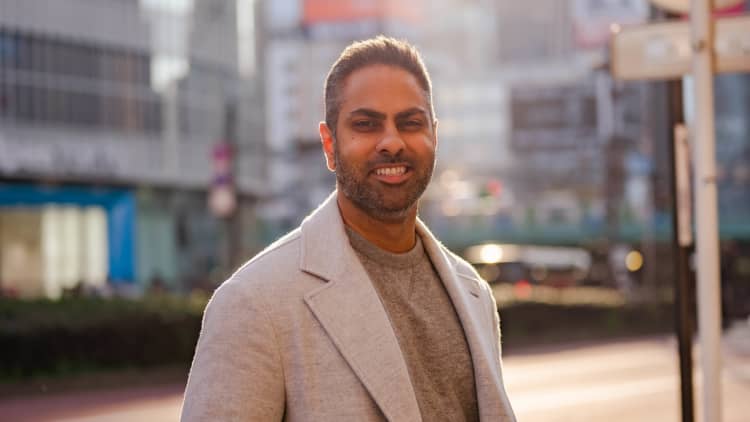Every couple handles their finances differently. But most financial experts would agree: Both individuals need to be on the same page when it comes to how they handle money together.
After all, financial disputes are commonly cited as one of the biggest reasons for divorce.
It's a financial dispute that brought Alisa and Jesse to consider divorce themselves. The couple lives in Portland, Oregon, and has been married for 10 years, but so far they've kept their finances mostly separate, they recently told Ramit Sethi on his "I Will Teach You to be Rich" podcast. Their last names were not used.
Though they make major decisions together, like buying a timeshare, Alisa is anxious about their financial future and doesn't think Jesse is disciplined enough to address their problems and improve their situation.
Sethi quickly realized the problem isn't just their differing money habits, but their opposing money beliefs. "You see money very differently," he told them.
They have a sizeable amount of debt and would like to be further along in their retirement savings than they are. Plus, their overall lack of an agreed-upon money strategy has led both Alisa and Jesse to wonder whether they can make their marriage work at all.
Sethi's take: The couple needs to address these deeper issues if they want their marriage to work and then if they want to successfully tackle their financial goals.
Here's a look at how they got to this point, and if it's enough to save their marriage.
When a spender meets a saver
Alisa is concerned about the couple's lack of retirement savings and large debt balance, but she's also facing shame and pressure from her family around the fact that the couple doesn't own a home or any other major asset.
Here's a look at their financial situation at the time of the podcast's recording:
- Physical assets: $0
- Investments: $29,478
- Savings: $22,383
- Debt: $95,933
- Combined annual income: $124,728
Growing up, Alissa's family didn't have a lot of money, she told Sethi. As a result, if she wanted something, her parents would often say "save your money."
"If you have parents who have even said the phrase, 'save your money,' you're probably further ahead than 50% of people your age," Sethi said.
On the other hand, Jesse's parents never encouraged him to save his money growing up, he said. The primary financial lesson Jesse remembers from his upbringing: "Money is meant to be spent."
Sethi said it's these opposing upbringings that sowed the seeds for Alisa and Jesse's money disagreements.
"Deep down, most of us assume other people were raised the same as we were, with the same values and the same messages, but they weren't," Sethi said.
'It's possible for us to live our rich life'
Alisa and Jesse took an important first step to address their money and relationship problems by seeking professional help from Sethi and his content on the financial side and from couples' counseling on the psychological side.
"I think it's possible for us to live our rich life," Jesse said. "We have work to do, but it's not as far out of our reach as we think it is."
While Sethi walked through their monthly expenses and identified areas for improvement, he ultimately decided to hold back on getting into the nitty-gritty details until the couple addresses how money has impacted their relationship.
"[I] needed to gently re-orient them to notice the money dynamic between them and give them a couple of small re-frames, such as how to think about money positively," Sethi said.
"When you're trying to change your relationship with money, you're not going to do it in one conversation. It takes time, it often feels really slow, but that's normal. Slow it down and take the wins along the way," he said.
Making progress
Ultimately, Jesse and Alisa believe they can work things out.
In follow-up videos after their call with Sethi, the couple seemed ready to begin the process of healing their individual relationships with money and how they manage their money together.
"My relationship with money is one of laxity, laziness, that doesn't serve me anymore," Jesse said he realized. "That can be changed. I believe in the ability to change our mindsets in fitness, so why not money?"
He recognized that he wasn't taking his credit card debt seriously and "seeing the numbers was a smack in the face." He's looking forward to having monthly money meetings with Alisa to develop their shared vision and a plan to work toward it.
Alisa, likewise, continued to unpack emotions around money that came from how her parents handled it and talked about it with her. While she's healing from that shame and anxiety, she feels better equipped to plan for the future.
"We have more time than I think to turn things around," Alisa said in her follow-up video. "I'm coming around to that now and starting to accept that."
DON'T MISS: Want to be smarter and more successful with your money, work & life? Sign up for our new newsletter!
Get CNBC's free Warren Buffett Guide to Investing, which distills the billionaire's No. 1 best piece of advice for regular investors, do's and don'ts, and three key investing principles into a clear and simple guidebook.



